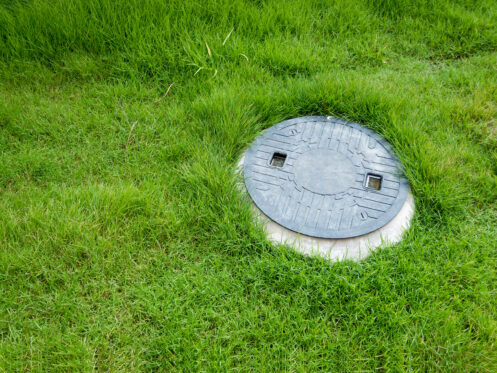A septic service primarily involves pumping out all of the waste from the septic tank and inspecting the system for any issues. This is something that needs to be done fairly regularly to ensure that your septic system continues working properly and that you can use the plumbing in your building with no issues. In this article, we’ll discuss how often a septic system should normally be serviced and how to tell when it’s time to schedule this service.
Recommended Septic Service Intervals
On average, most septic systems will need to be pumped out and serviced once every three to five years or so. That said, how often you’ll need to have this service performed can vary depending on both the size of your septic tank and how many people live or work in the building. The reason that the number of people matters is obviously that it directly influences the amount of waste that goes into the septic system.
There are times when a septic may be able to go quite a bit longer than five years before it needs to be pumped out and serviced. This is especially true for properties that aren’t occupied daily and only used at certain times, such as a cabin or vacation home. While you may also be able to go for more than five years between septic pumpings if only a few people regularly use your septic system, we wouldn’t recommend it. The reason is that a variety of issues can occur if your septic tank gets too full, which can result in you not being able to use your plumbing or cause serious damage to your septic system.
The Importance of Regular Septic System Inspections
While you may only need to have your septic tank pumped every three to five years, most experts recommend having it inspected every one to two years. The main reason is that inspecting the system by looking inside the tank is the only real way to determine how full it is and if it needs to have the waste and sludge pumped out. To check the level of the waste in your septic tank, a septic company will need to do a bit of digging to access the cover on each side of the tank.
If the layer of solid and sludge has built up to where it fills around a third to a half of the tank, the company will recommend that you get the tank pumped. You never want to let the solid waste rise above halfway since this can then result in solids flowing out and getting into the leach field. The reason this can happen is that the outlet baffles that allow effluent or liquid waste to flow out into the leach field stick down below the top of the water level. This is important since it ensures that all of the scum that floats on top of the water can’t get drawn out of the tank and flow out into the leach field.
How to Spot the Signs That Your Septic Systems Needs Servicing
If your septic tank ever gets too full, the solid waste can start to block the inlet baffle where all of the wastewater from your plumbing system drains into the tank. If this happens, all of the wastewater that goes down your toilets and drains obviously won’t have anywhere to go. That means that the sewer line leading from the building to the tank will quickly fill up and eventually result in sewage backing up and flowing out inside the building.
Any time you start experiencing sewage backups in your building, it’s essential that you contact a septic service immediately so that they can check the level inside your septic tank and make sure your sewer line isn’t clogged. You should also refrain from using your plumbing since anything that goes down a drain or toilet will just come straight back up out of the floor and shower drains on the lowest level of the building.
The good news is that you will usually notice some signs that your septic system is getting too full before it gets full enough for sewage to start backing up inside or solid waste to start flowing out into the leach field. In most cases, you’ll start noticing that your sinks drain slowly and your toilets don’t flush properly or flush slowly. You’ll also usually hear a noticeable gurgling or chugging sound as your sinks drain and toilets flush.
Another thing to watch for is if you smell a distinct sewage odor when near your septic tank and leach field. The way septic systems are designed and installed means you should never be able to smell sewage when everything is working properly. If you do smell sewage, it usually means that either your septic tank is leaking or lots of solid waste has flowed out into the leach field and clogged it up. In either case, you may also notice that the ground around the septic tank or leach field is overly wet or has pools of standing water.
At Dynamic Home Service, we’re dedicated to providing exceptional plumbing and septic services to residents in Manalapan, Monroe Township and the surrounding areas. Whether you have a septic system or a standard sewage system, you can count on us for all of your needs. To schedule a septic system inspection or any other service, contact us today.

